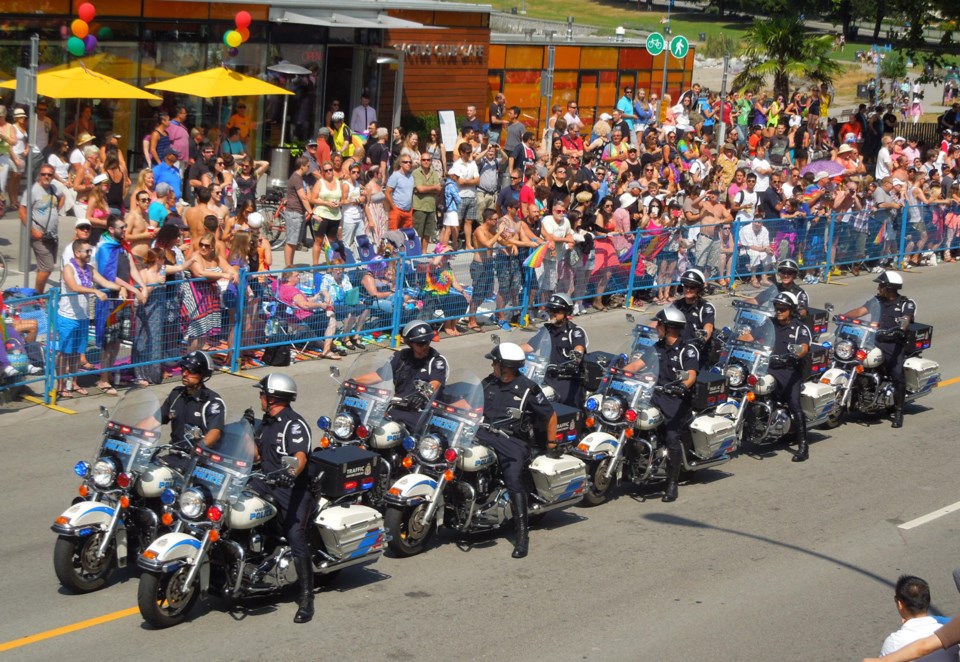There is still time for the Pride Society to change its mind about banning cops in uniform from next summer’s Pride Parade. But I wouldn’t bet on it.
What you can be sure of, though, is that the decision to carry out the ban is creating significant discord among gay activists to say nothing of the general public.
Well-known gay activist Stan Persky — who describes himself as belonging to “an earlier generation that invented gay liberation” — told the Vancouver Sun: “It seems to me a shoot-yourself-in-the-foot mistake for the Pride Parade to adopt a perspective about the police that isn’t widely shared within the gay community and doesn’t reflect the LGBT+ community’s experience with the police especially in Vancouver.”
Folks at city hall are truly puzzled if not totally annoyed by the decision. Their understanding was the same as the cop’s, which was this: Conversations between the cops and the Pride Society were ongoing about the role the police would play. The year prior, police agreed to reduce the number of members marching in uniform to 20 per cent while the rest of the contingent would wear T-shirts.
Cops and the mayor were of the opinion that nothing had been concluded in last September’s meeting. Talks would be ongoing.
The Pride Society now says that was not true. More specifically, in an article posted on the society’s website, they say they were clear with the police in September about no cops in uniform in the 2018 parade: “We didn’t expect the Vancouver Police to lie.”
The event has been part of the Vancouver scene since 1981 and last year reportedly attracted more than 600,000 folks. Long-time city councillor and early Pride organizer Tim Stevenson says he and other gay people worked long and hard to have police included in the parade to help legitimize it and improve relations between his community and the cops.
“That was our struggle,” he said this week while expressing frustration at a decision that totally blind-sided him.
“It is a generational thing,” said Stevenson, noting that only one member of the city’s gay advisory committee — an older white male — supports cops in uniforms marching in the parade. The rest are much younger and all opposed to that proposition.
The Pride Society canvassed what they refer to as their “elders.” Many of them fought the battles that led to some of the rights and freedoms people enjoy today. A clear majority were against excluding cops in uniform.
The Pride Parade was seen as an act of inclusion, a symbol of acceptance and co-operation among law enforcement officers and the gay community.
That apparently was before the Toronto branch of Black Lives Matter blocked that city’s Pride Parade last year to protest the presence of police in uniforms because of rocky relations between the cops in that town and the black community there and south of the border.
Vancouver, however, is not Toronto. Relations here with the cops are very different, and to the degree there has been discord in the past it is being worked out.
There is also the point that a fair number of cops who march in the Pride Parade are openly gay and the fact they can now wear a police uniform is a fair measure of the distance the cops have come.
The Pride Society says there is now more to consider than those old white males who fought yesterday’s battles. Resistance to the police comes most strongly from younger gay people, who define themselves at the intersection of sexuality and ethnicity — who also categorize themselves as Indigenous, black or people of colour. They were most outspoken about grievances concerning treatment by police. And they clearly won the day.
But what the community will inevitably lose as a result is still unclear while the Pride Society continues to tie itself in knots justifying a divisive decision.
By the way, to add insult to injury, Stevenson says the Pride Society, which gets $50,000 from the city as a parade with “civic status,” now has its hand out again to the city for help covering a $100,000 deficit from last year’s event even though “they know the rules.”
Finally, the Pride Society laments on its website: “It’s disappointing that this is the issue that has caused so many in our community to be enraged.”
Further evidence of just how out of touch they are.
agarr@vancourier.com
@allengarr



